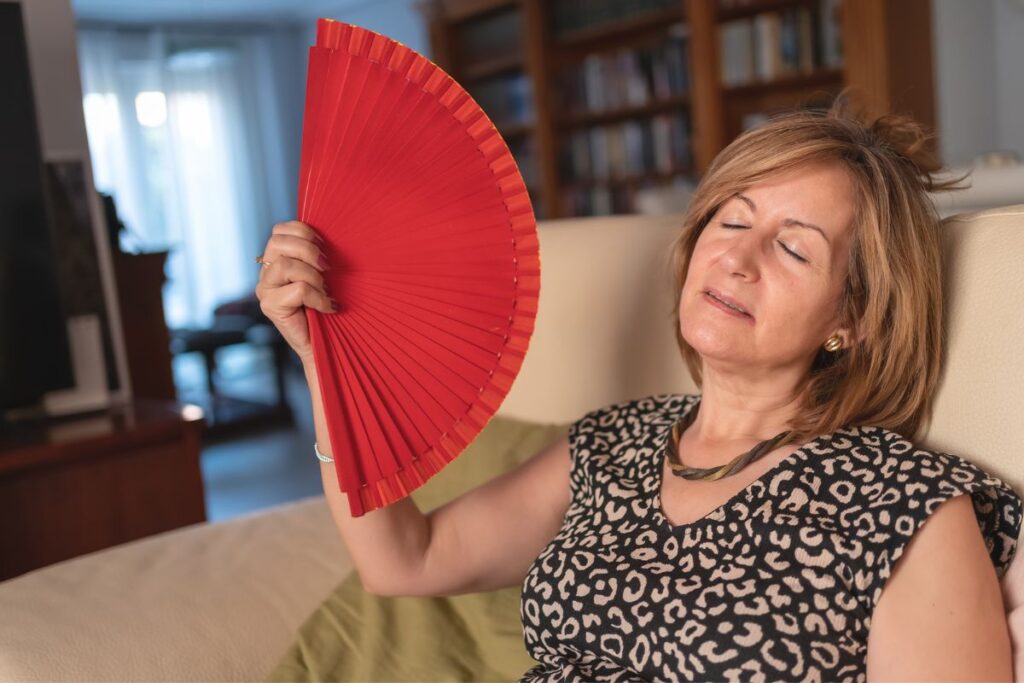A new non-hormonal medication, VEOZAH™ (fezolinetant) offers relief for women+ who experience menopause-related hot flashes. Hot flashes can affect a woman’s quality of life with symptoms potentially lasting years. Historically, the recommended treatment for this symptom has been hormone replacement therapy. However, not everyone can use hormones, and some women+ prefer not to use them or want to try other options first. If a woman wanted a non-hormonal option, the antidepressant, Brisdelle®, was also an approved treatment, and there are off-label uses of other medications for hot flashes. Now, this breakthrough medicine gives women+ another choice so they don’t have to suffer through hot flashes.

FDA-approved non-hormonal hot flash medication
Are you tired of hot flashes interrupting work discussions, meetings, exercise, sleep, conversations with friends and family, energy levels, and sex? The sudden rush of heat felt by many menopausal women+ can be disruptive and bring on other symptoms like light-headedness and heart palpitations. Some women also experience cold flashes, which may follow hot flashes.
VEOZAH™ is a first-of-its-kind treatment method approved by the Food and Drug Administration in 2023. This new class of drugs is known as a neurokinin 3 (NK3) receptor antagonists. It has been dubbed a medical breakthrough because it targets the area of the brain responsible for thermoregulation and subsequently hot flashes in the body. This is the first neurokinin receptor antagonist to receive FDA approval; another one is in clinical trials.
It’s important to note that fezolinetant does not stop hot flashes altogether. However, it reduces their frequency and severity.
Like all medications, there are potential side effects and complications. One concern related to VEOZAH is the possibility of liver damage. Consequently, bloodwork will be required for the first few months of use to help identify any issues early.
Due to this safety risk, the Food and Drug Administration (FDA) added a black box safety warning. This is the highest safety warning for a medication. While the risk of liver injury is rare, and bloodwork will be done before you take the medication and at specific intervals during use, the risk remains.
VEOZAH™ clinical results
Women+ take one 45-milligram pill each day, with or without food, to relieve hot flashes.
After 12 weeks of use, clinical study participants saw hot flashes reduce by about 60%.
In the placebo group, hot flashes were reduced by about 45%.
In the study, women+ also saw the severity of their hot flashes improve as well as their quality of sleep.
Side effects
Possible side effects include:
- Abdominal pain
- Diarrhea
- Insomnia
- Back pain
- Hot flash
- Increased liver blood test values (hepatic transaminase elevation)
Before starting this medication, your doctor will perform baseline bloodwork and then additional lab testing while using the medication. Liver injury is a rare side effect.
Tell your doctor if you have these symptoms, as they may indicate liver damage:
- More tired than usual (fatigue)
- Nausea
- Vomiting
- Unusual itching
- Light-colored stools
- Dark urine
- Yellowing of the skin or eyes (jaundice)
- Swelling in your belly area (abdomen)
- Pain in the right upper stomach (abdomen)
If you notice any signs of liver injury, stop taking the medication immediately.
Black box warning
These warnings are added to medications with known safety risks, even if the risk is rare, as it is in this case. In this case, the risk is serious liver injury.
If you have any side effects, talk with your doctor. If you stop the medicine, you can prevent further injury, and your liver may potentially return to its normal function.
That’s what happened in the patient who experienced symptoms 40 days after taking the hormone-free hot flash medication. She stopped the medication immediately, and slowly, her liver blood levels returned to normal.
The FDA requires lab work if you take this medication so your doctor will order blood tests to check your liver function, monitoring for any signs of abnormalities.
Once on the medication, additional follow-up bloodwork is also required. Labs are ordered monthly for two months in addition to the already recommended 3, 6, and 9 month tests. So, essentially, you’ll test for three months and then months 6 and 9.
If you notice any signs of liver injury, stop taking the medication immediately.
Who should not take it?
You should not use VEOZAH, due to contraindications if you have:
- Known cirrhosis
- Severe kidney problems (renal impairment) or failure (end-stage renal disease)
- Take medications called CYP1A2 inhibitors
Tell your doctor about any herbal medicines, supplements, vitamins, prescription medication, or other over-the-counter medications you’re taking.
VEOZAH™ can affect how the other medications work and those other medications may also affect how VEOZAH™ works.
How VEOZAH™ works
VEOZAH™ works by working with the brain chemical neurokinin B (NKB) and your brain’s thermoregulator.
Before menopause, neurokinin B (NKB) and estrogen are balanced. When balanced, they regulate the body’s temperature control in the brain.
As hormones fluctuate and drop during menopause, estrogen and NKB are thrown off balance. That can cause hot flashes.
VEOZAH™ helps to bring back that balance in the body by blocking NKB to reduce the number and intensity of hot flashes.
The Menopause Society talked about how this new medication works and why this is a significant moment in women’s health.
A woman’s research helped lead to this hot flash treatment
Targeting this part of the brain to help hot flashes dates back to a study by Dr. Naomi Rance at the University of Arizona College of Medicine in the 1990s. The physician and researcher was at work when she first experienced a hot flash. Until that point, Rance had been studying how estrogen influences reproduction and then decided to turn her attention to hot flashes.
Rance noticed post-menopausal women had larger brain cells (neurons) than pre-menopausal women, which she noted was unusual because things typically get smaller with aging.
She later found those neurons impact how estrogen changes body temperature. Further studies have developed methods that block symptoms, such as the protein neurokinin-3 receptor, reducing hot flashes.
Listen as Dr. Rance talks about her research and becoming an expert on estrogen and thermoregulation, which she said in a 2017 interview should be more highly studied.
Treating hot flashes
VEOZAH™ is one option to treat hot flashes. Women can also ask their doctor about hormone replacement therapy or these non-hormonal medications:
- Brisdelle®– first non-hormonal FDA-approved hot flash medication
- Anti-depressants
- Gabapentin and Lyrica– anti-seizure medications used off-label
- Clonidine– high blood pressure medication used off-label
You can also try cognitive behavioral therapy or CBT, which again focuses on your brain to reduce hot flashes.
Nutrition also plays a role. Certain foods and alcohol can trigger hot flashes.
VEOZAH™ is a breakthrough in medicine, and it highlights the fact that women+ have choices to treat menopause symptoms. Know your options and do what’s best for your body.
Cagnacci A, Venier M. The Controversial History of Hormone Replacement Therapy. Medicina (Kaunas). 2019 Sep 18;55(9):602. doi: 10.3390/medicina55090602. PMID: 31540401; PMCID: PMC6780820.
FDA Approves Novel Drug to Treat Moderate to Severe Hot Flashes Caused by Menopause | U.S. Food and Drug Administration
Mechanism of Novel FDA Approved Nonhormone Treatment Options for Vasomotor Symptoms Explained | The Menopause Society [YouTube]
Rance NE, Dacks PA, Mittelman-Smith MA, Romanovsky AA, Krajewski-Hall SJ. Modulation of body temperature and LH secretion by hypothalamic KNDy (kisspeptin, neurokinin B and dynorphin) neurons: a novel hypothesis on the mechanism of hot flushes. Front Neuroendocrinol. 2013 Aug;34(3):211-27. doi: 10.1016/j.yfrne.2013.07.003. Epub 2013 Jul 17. PMID: 23872331; PMCID: PMC3833827.
UA Scientist’s Research May Lead to Treatment for Hot Flashes | The University of Arizona [YouTube]
You may also like…

Menopause and Hair Loss: Understand the Connection and Find the Right Solution
Learn about solutions for menopausal women experiencing thinning hair, a receding hairline, or bald patches.

Clear Your Mind: 5 Potential Herbal Remedies for Menopausal Brain Fog
Menopausal “brain fog” (or menofog) is a real thing, but it doesn’t have to be the end of the road. While treatment options are lacking, herbs hold promise.

A Guide To Over-the-Counter (OTC) Menopause Supplements: Relief in a Bottle?
The menopause supplement guide provides information on key non-hormonal ingredients for symptom relief so you and your doctor can determine which one(s) may or may not work for you.

